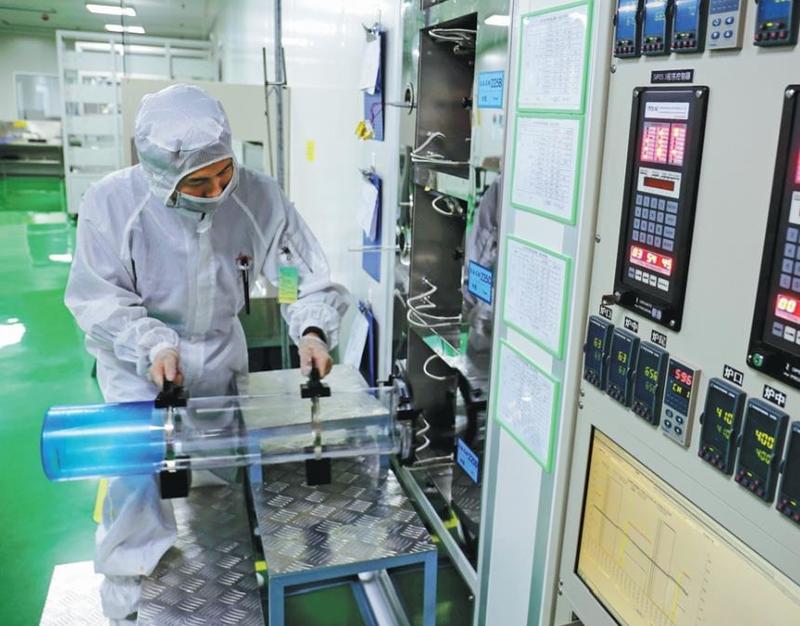 In this undated photo, a staff member works on producing auto chips at a plant of a chip maker based in Chizhou, East China's Anhui province. (SHENG WENPENG / FOR CHINA DAILY)
In this undated photo, a staff member works on producing auto chips at a plant of a chip maker based in Chizhou, East China's Anhui province. (SHENG WENPENG / FOR CHINA DAILY)
Chinese companies should get prepared for the rise in chip demand as cars become smarter, said analysts, after some carmakers experience pandemic-caused chip shortages.
"It (the shortage of chips for car electronics) is a historical problem, as China relied on imported chips from Europe, the United States, Malaysia, Japan and South Korea," said Yale Zhang, managing director of Shanghai-based consultancy firm Automotive Foresight.
The lockdown due to the coronavirus outbreak interrupted chip production and the transnational transportation to some extent, which cut the supply of chips to the Chinese market
However, the lockdown due to the outbreak of the novel coronavirus interrupted chip production and the transnational transportation to some extent, which cut the supply of chips to the Chinese market.
ALSO READ: Chip shortage may disrupt vehicle output
As for the demand side, China's automobile industry has had a sharp recovery from the pandemic lockdown, with the market experiencing eight consecutive months of sales growth.
In June, the country's leading automobile industry association, the China Association of Automobile Manufacturers, forecast a full-year decline in sales of 10-20 percent.
But, the association estimated on Friday that China is expected to sell 25 million vehicles this year, down just 2 percent from 2019.
READ MORE: Vehicle sales in China to continue on upward trend
The imbalance between supply and demand has resulted in China's shortage of chips, Zhang said. "With the resumption of production and transportation, the situation can be turned around quickly."
Nevertheless, John Zeng, managing director of consulting firm LMC Automotive Shanghai, said that to ensure a sound development of the automobile industry, especially in the era of intelligent connected vehicles, the problem of auto chip shortage should be paid more attention and solved fundamentally.
Auto chips, as small components, were to some extent neglected in the period of traditional car manufacturing in China, leading to the country having defects in the layout of the industrial chain and resorting to imported chips.
Data shows that in 2019, the global auto chip market was worth around US$47.5 billion. While China's auto chip industry was valued at less than 15 billion yuan (US$2.29 billion), accounting for around 4.5 percent of the global total.
In contrast, the scale of the Chinese automobile industry accounted for more than 30 percent of the world that year.
When the intelligent connected vehicle era comes, the whole industry is bound to have higher requirements and more demand for auto chips, which will feature fast upgrades and a high-level safety.
Before it's too late, the industry should learn lessons from the chips used in mobile phones, and take precautions to give more opportunities to domestic chip makers, Zeng said.
READ MORE: Switching gears for R&D edge
According to Yuan Chengyin, general manager of the National New Energy Vehicle Technology Innovation Center, the cost of auto chips in China was around US$400 per car in 2019, and is estimated to be US$600 in 2022. With estimated sales in the Chinese automobile market of 25 million in 2022, the market scale of the country's auto chips will reach US$15 billion.
The automobile chip market has huge development opportunity, and Chinese enterprises should grasp it, Yuan said.
There have been some Chinese companies, including BYD, Star-Power Semiconductor and Horizon Robotics, and Sino-foreign joint ventures making strides in developing automobile chips.
In May, BAIC Motor joined hands with Imagination Technologies, a British semiconductor and software design company, to set up a joint venture, focusing on the research and development of autonomous driving chips and language interaction chips.


